Unlocking ENFP Leadership Potential: Strategies for Success

Sorry, there were no results found for “”
Sorry, there were no results found for “”
Sorry, there were no results found for “”
ENFP is one of the 16 personality types outlined in the Myers-Briggs Type Indicator (MBTI) personality test. It denotes Extraversion (E), Intuition (N), Feeling (F), and Perceiving (P). Such a cocktail of desirable traits makes ENFPs some of the most charismatic and inspiring leaders. ENFP leaders are creative visionaries, full of energy and innovative ideas.
Even though they bring a unique flavor to the field of leadership, they are not immune to characteristic flaws either. In this detailed guide, we look at what makes the ENFP personality type ideal for leadership positions, their strengths and weaknesses, and how they can tap into their true potential.
Whether you are an ENFP eyeing a leadership role or someone interested in understanding how personality can affect management styles, this article will answer all your questions. So, let’s walk you through the art and science of ENFP leadership.
ENFPs are defined by the following underlying traits associated with the personality type. These are:
The above qualities allow ENFPs to tune into people’s feelings and emotions. They can connect with others on a deeper level and care profoundly for them. Such a genuine connection makes them the classic people’s person.
But what do ENFP leaders look like? Let’s find out.
Considering the traits detailed above, it is evident that ENFP leadership draws people in like a magnetic force. They have an ideal blend of characteristics that make them perfect for leadership roles.
The combination of extroverted intuition allows ENFP leaders to hold meaningful interactions. This helps them connect with team members and develop an atmosphere of collaborative working based on approachability and charisma.
ENFP leaders are a source of boundless energy. Their enthusiasm is contagious to the extent that they revitalize workspaces and inspire team members to bring their best game.
The ENFP leader is a visionary. They have a natural inclination toward imaginative thinking and future possibilities. Such a perspective allows them to set ambitious goals, take on unexpected challenges, and inject innovation into the leadership style.
Emotions and personal values guide ENFP leadership. Such an empathetic environment fosters a harmonious work environment that prioritizes the well-being of team members. Their emotional intelligence helps them develop teams with a strong sense of belonging and emotional connection to achieve shared goals.
Flexibility and open-mindedness are the key characteristics of ENFPs. Their ability to embrace and navigate changes makes them perfect leaders for dynamic projects where you may have to pivot strategies according to varying conditions.
The most notable feature of ENFP leadership is the ability to catalyze creativity. Their passion for work and hands-off leadership strategies inspire team members to experiment with new ideas and live up to their full creative potential.
ENFPs were made for teamwork. They encourage collaboration and participation, making every team member feel seen and heard. Plus, they accept and acknowledge diverse perspectives and seek inputs from everyone to synergistically drive success. ENFPs are also very good at letting their team operate independently without micromanaging them.
ENFP leaders take the whole team along. They are great at communicating a vision and can identify each individual’s intrinsic potential. They are approachable and open to feedback and input. Their empathetic and likable nature works well to motivate teams. They combine facts with emotions and values to gain the trust of their teams.
The resulting blend of charisma, vision, empathy, flexibility, and teamwork makes the ENFP personality type the perfect candidate for any leadership role.
We’ve already seen that ENFPs are natural leaders. Here’s an overview of the strengths that characterize ENFP leadership:
ENFP leaders, just like others, struggle with some areas of weakness as well.
Now that you have a well-rounded idea of how ENFPs fare as leaders, let’s compare their leadership style with a few other personality types. Here’s a high-level overview of how they are different:
| Personality type | Key traits of leaders | Key traits of ENFP leaders |
| INTJ | Strategic planners who analyze complex problems and implement well-thought-out solutions. Logical and systematic leaders focused on achieving goals | Innovative and creative folks who thrive on spontaneity and possibilities. People-centric leaders focused on fostering team dynamics |
| ENTJ | Strategic and assertive with the natural ability to organize and lead, focusing on efficiency and goal-achievement. Task-oriented and directive | Open-minded and passionate leaders with a people-oriented approach to goal attainment. Collaborative |
| INFJ | Empathetic and insightful leaders who are slightly more reserved. Understand individuals to develop a supportive work environment | Extroverted leaders who are empathetic yet outgoing. Encourage diverse perspectives but value dynamic environments more |
| ENFJ | People’s people who connect with individuals on a personal level. More methodical and less flexible | They connect with others and inspire them. Highly flexible and adaptable |
| ISTJ | Detail-oriented leaders who are less spontaneous and open to change. Value stability and reliability | Big-picture visionaries; creative, spontaneous, and open to change. Flexibility and spontaneity disrupt stability |
Like any other person, ENFPs can learn how to enhance their existing leadership qualities and minimize challenges through intentional strategies and self-awareness. Master ENFP leadership using the following tips and tricks:
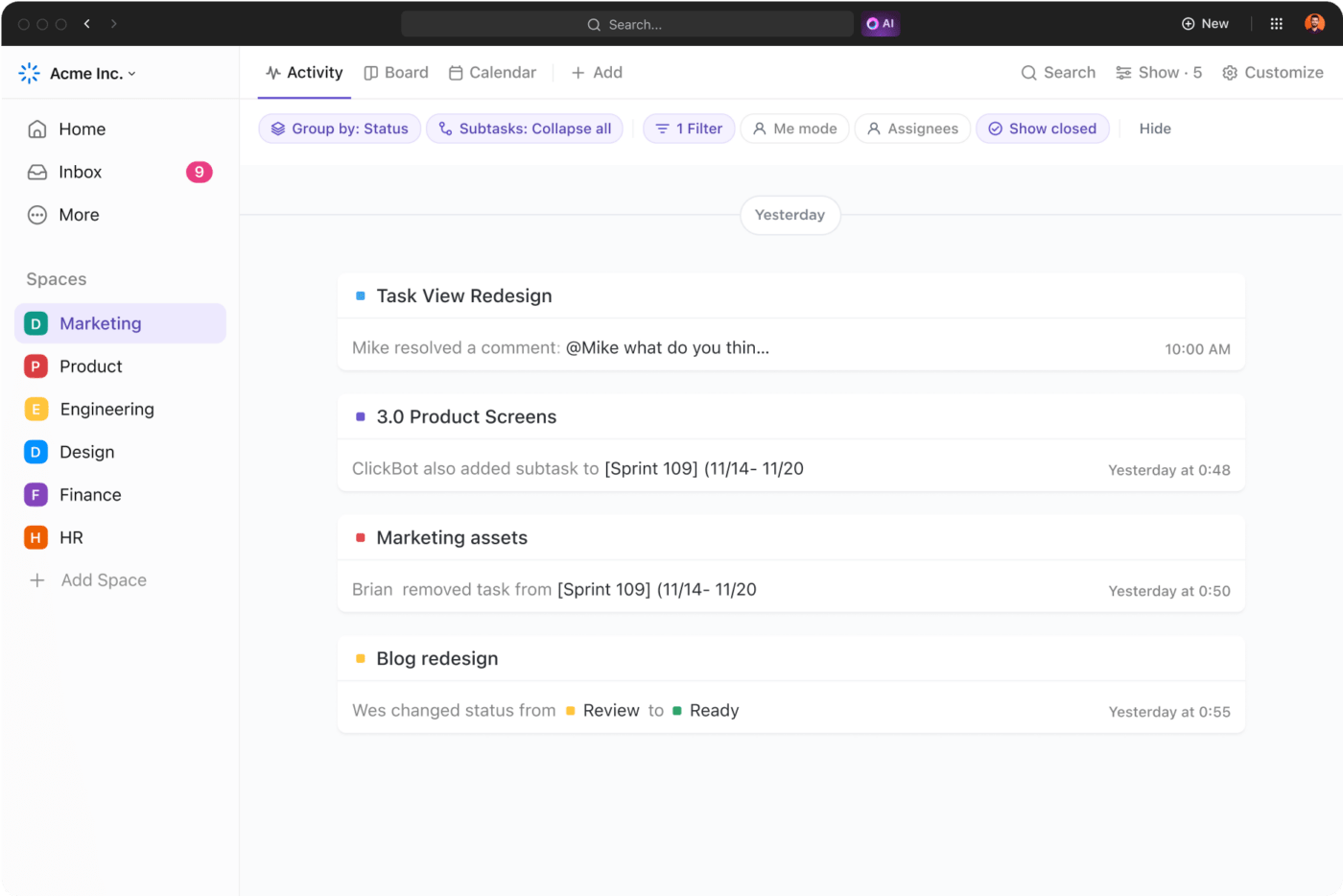
Project management tools like ClickUp can address some of the inherent challenges and enhance the natural strengths of ENFP leadership.
These tools provide a structured framework for handling all project requirements to meet the larger goal so ENFPs don’t feel bogged down by details. Depending on their preferences and leadership styles, they can also visualize the entire project from different views, such as Gantt Charts, Kanban Board View, List View, etc. At the same time, it allows them to stay practical while defining the deliverables or timelines so that they don’t overcommit.
On the other hand, project management platforms make the workplace collaborative and facilitate communication, which plays to the strengths of ENFPs. Similarly, project management tools with AI/ML capabilities can lend data-backed credibility to their futuristic vision.
Overall, a project management tool is a must-have for all leaders, regardless of their personality types.
Since managing task priorities and setting boundaries is a bit of a challenge for ENFPs, they will benefit from this feature of a project management tool.
For instance, ClickUp Task Management allows ENFP leaders to monitor all underlying tasks even as they work on multiple projects. Its features enable them to set priorities, practice time blocking, assign tasks, and define interdependencies for seamless task execution. Focusing their energy on high-impact, time-sensitive tasks will improve project outcomes.
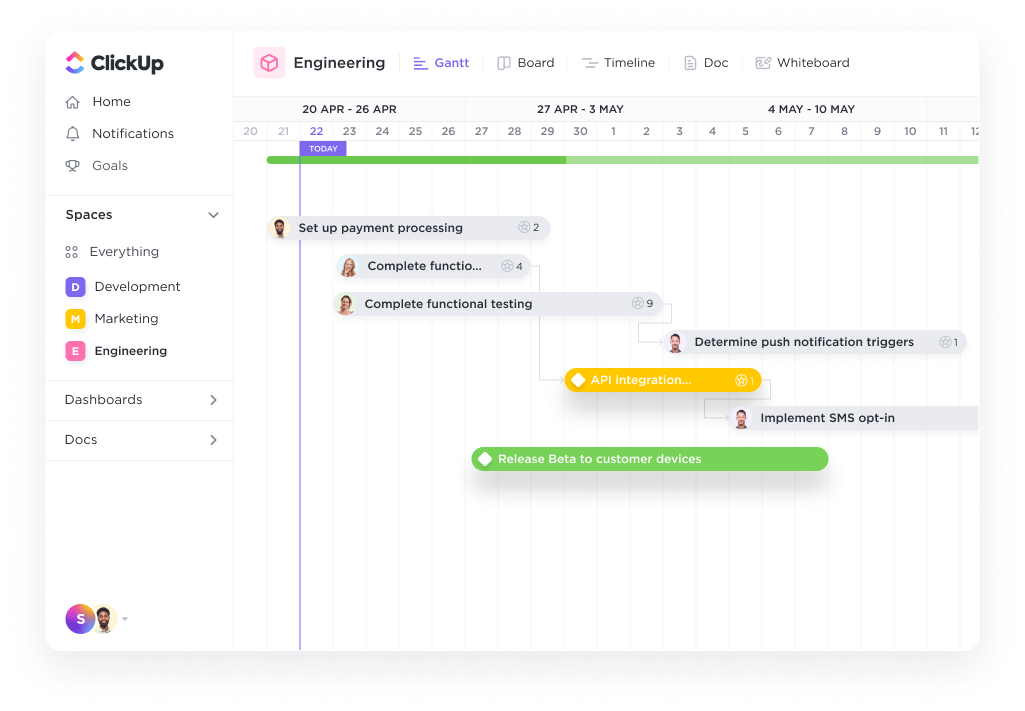
ClickUp also offers an overview of their team’s workload so ENFPs can allocate resources, ground expectations in reality, and set clear boundaries for themselves and their teams.
The resulting work-life balance will prevent burnout without compromising overall productivity while maintaining the empathy ENFPs hold dearly.
Decision-making is often overwhelming to ENFPs, especially when the stakes are high and the time is short. Though they are visionaries, they can also be overthinkers and unduly stressed by the pressure of decision-making.
Fortunately, a structured decision-making approach releases the stress and cognitive load involved. A decision-making framework offers leaders a systematic way to combine intuition with practical considerations to reach decisions efficiently.
Use any established decision-making framework, from cost-benefit analysis to SWOT analysis to the Eisenhower matrix to fishbone diagrams, to match the problem and context.
The best thing about these frameworks is that they are flexible. You can adjust them for different situations and viewpoints and align them with your goals. They help you discover the best course of action without the hassle.
The inability to pay close attention to details is possibly the largest chink in the armor of ENFP leadership. However, training your mind to dig deeper and dive into the details can improve the precision and thoroughness of your decision-making and project-management skills. This helps navigate complex situations and minimize risks.
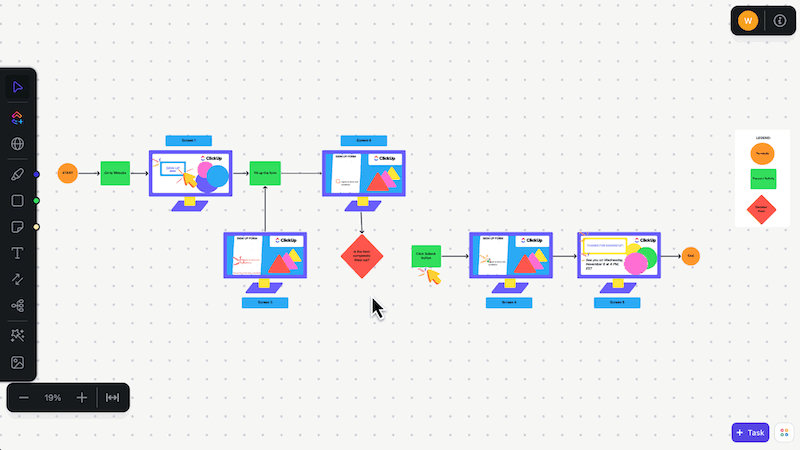
Leaders with ENFP personality types can set aside specific times for focused, detail-oriented tasks. Staying mindful while breaking down projects into smaller, manageable components can boost focus.
Use process mapping tools to stay on top of specific details and deadlines with all the necessary checks and balances. Take tips from detail-oriented peers and practice to master this skill. ClickUp offers collaborative process mapping tools like ClickUp Whiteboards and Mind Maps to help flesh out your great idea into specifics.
ENFPs live in highly energetic and collaborative work environments. However, as we have seen, they are not comfortable with conflict and negative feedback. You can address this discomfort by actively practicing conflict-resolution skills and promoting open communication
Start by accepting the existence of conflicts rather than avoiding them. Aim to balance logic and emotion, actively listen to the perspectives and experiences of others and find a way to reach a common ground.
The endless zeal and willingness to try new things put ENFPs at risk of going overboard. While it’s good to aim for the stars, staying grounded and practical is also essential. ,
To temper creativity with caution, ENFPs must methodically assess the potential pros, cons, risks, and consequences. We’ve already discussed some decision-making, scenario-planning, and process-mapping tools that ground aspirations in reality.
You may lean on colleagues or team members with a more analytical mindset to collect objective and realistic feedback. It will widen your horizon and feed into your inclination to include holistic perspectives.
This will help strengthen your naturally creative leadership style while keeping you anchored.
In general, automating routine and repetitive tasks improves workforce efficiency. However, this strategy becomes all the more valuable when ENFPs are at the helm since they are naturally averse to everyday and repetitive chores. It helps free up their time and mental energy for strategic and creative endeavors.
Workflow automation modules of project management tools like ClickUp can be instrumental here. You can build customized automation to match project or business requirements and save time and resources.
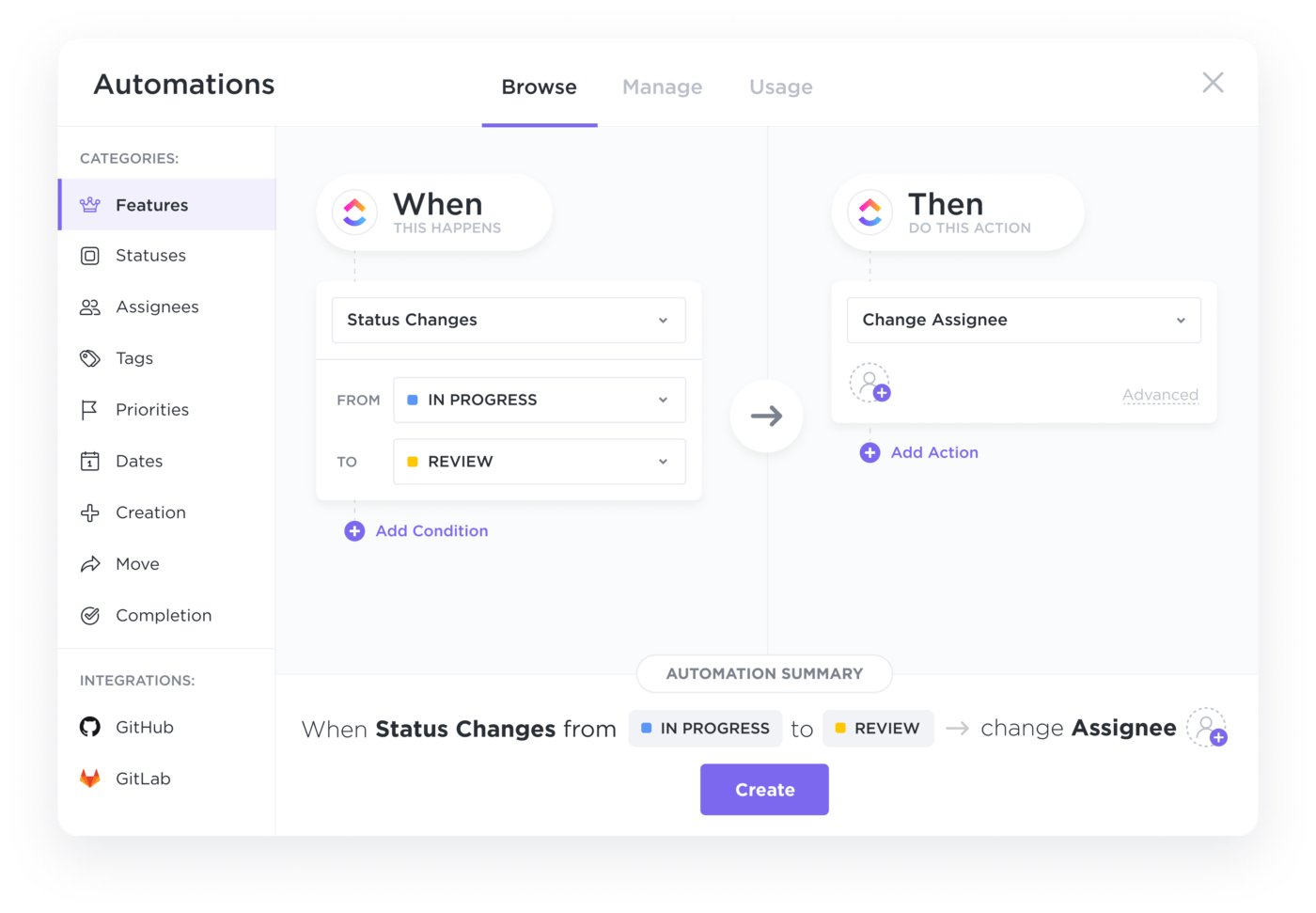
To implement automation, identify the tasks prone to repetition and brainstorm ideas on how to streamline them using automation. Then, it’s simply a matter of setting up the automation and assessing other workflows to discover additional automation opportunities.
The passion and emotional investment ENFPs bring make it difficult for them to detach from their work. This makes them sensitive while receiving feedback, especially when it is negative. At the same time, ENFPs forge emotional bonds with their team, making them somewhat vulnerable.
The ENFP leader can practice mindfulness and effective stress handling to cultivate resilience. Regulating emotions will help them bounce from setbacks while shielding themselves and their teams. Building a support system, talking to peers, seeking constructive feedback, and viewing challenges as opportunities are a few more ways to build emotional resilience.
ENFPs can embrace a growth mindset, learn from failures, and use all experiences (negative and positive) for personal and professional development.
Self-reflection and continuous learning are integral traits of an effective leader, regardless of their personality type. Self-reflection grants leaders an opportunity to deeply analyze their strengths and weaknesses. On the other hand, continuous learning helps them evolve as a person and leader.
Writing journals, mind-dumping, guided reflection exercises, and creating vision boards help with introspection and goal-setting. They can help ENFP leaders become more self-aware and organize their thoughts better.
Continuous learning offers two-fold benefits for ENFP leaders. First, it caters to their need for new challenges. Second, their willingness to upskill, learn, attend workshops, keep up with trends, etc., inspires the team to follow suit.
ENFPs are extroverts who value human connections, thrive on social interactions, and seek ways to expand their perspectives. This puts networking and collaboration right up their alley!
Attending industry events, joining professional associations, participating in online forums, and talking to peers allow ENFPs to build solid networks, share ideas, seek support, and gain meaningful insights.
Along the same lines, collaborating with internal and external stakeholders will enable them to innovate, socialize, and network.

Investing in project management tools can be a great way to build collaborative projects where teams can brainstorm, communicate, and work collaboratively to reflect the ENFP’s social and creative strengths.
For instance, ClickUp Docs can help teams work collaboratively on documents, processes, and ideas in real-time. Features like Chat and comments make communication more accessible and more efficient, allowing the ENFP leader to energize the team.
Goal-setting and tracking progress connects the ENFP’s vision to action items. It empowers them to witness how every activity contributes to shared objectives while granting visibility into the bottlenecks and obstacles.
ENFPs can leverage SMART (Specific, Measurable, Achievable, Realistic, Time-bound) goals to provide a structured framework for themselves and their teams in meeting the overarching vision that defines success.
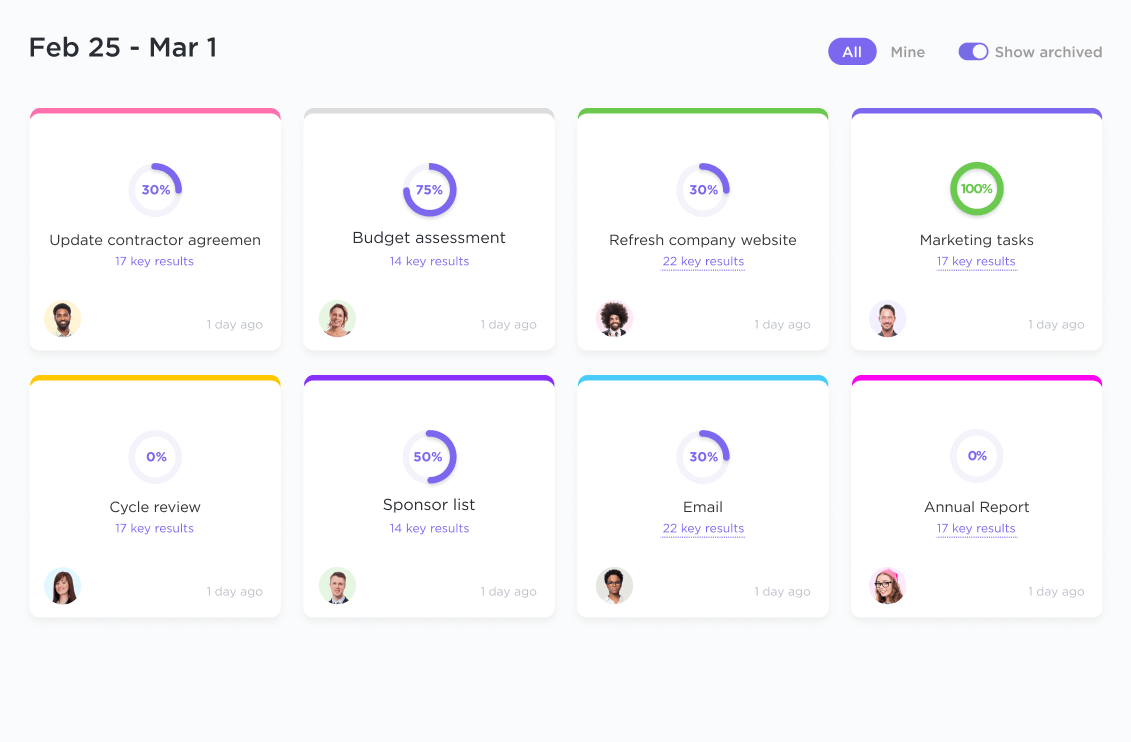
With tools like ClickUp Goals, ENFPs can break down tasks based on priorities and prepare a timeline for daily, weekly, monthly, and quarterly milestones. ClickUp personalizes goal setting and tracking by offering custom views matching leadership styles, processes, and workflows.
As goal setting and tracking is a continuous effort involving revisiting and refining these goals occasionally, ENFPs can stay in charge without sweating over the small stuff.
From celebrating achievements to triggering allied tasks, ClickUp can orchestrate everything so leaders can focus on short-term objectives and long-term visions.
ENFPs are natural leaders. They are charismatic, inspirational, and social and connect with others on a whole different plane. Having an ENFP leader on your team is a great way to ensure success.
However, they are not immune to certain flaws. They can be sensitive, impulsive, and unpredictable, sometimes affecting their leadership performance. Their visionary ideas also don’t leave a lot of scope for granular details. Their leadership can become more effective with intentional strategies like those discussed above.
Although the MBTI personality types are a great yardstick to assess an individual’s capabilities, preferences, and work styles, they are not absolute and universal. After all, every person is unique and personality is just one aspect of their overall makeup.
The right approach would empower leaders with the right tools and technologies to reinforce their strengths and mitigate their weaknesses. Whether you have an ENFP or an INTJ leader, consider investing in a customizable project management tool to help them grow. Sign up to know more.
Yes, ENFPs are excellent leaders. They bring forth a unique set of qualities ranging from creativity and enthusiasm to collaboration and innovation, which makes natural leaders. Their ability to inspire team members and connect with them empathetically fosters a dynamic and positive work environment.
Yes, ENFPs thrive in managerial roles as they can tap into their natural charisma and interpersonal skills to help teams achieve their goals.
Despite their numerous strengths, ENFPs struggle with the following issues:
Staying mindful of these tendencies and following strategies to overcome such weaknesses can mitigate such setbacks.
© 2026 ClickUp